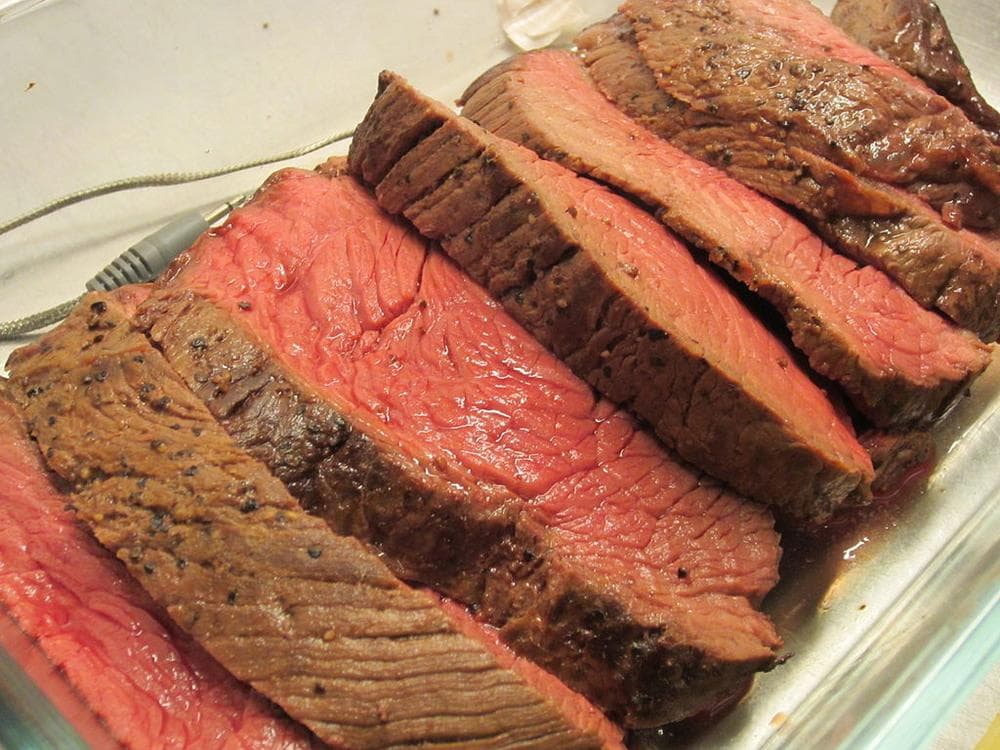Advertisement
What A Difference A High-Fat Day Makes — To Your Gut Bugs
Stop reading right here if you just want to eat your holiday roast in peace. But if the familiar caveats about weight and cholesterol don't work for you anymore, and you're looking for a whole new reason for restraint among the rich holiday treats, here it is: High-fat eating wreaks changes in the microbes that inhabit your gut with such dramatic rapidity that even a single day can make a difference.
That finding is just out in the journal Nature, in a study titled "Diet rapidly and reproducibly alters the human gut microbiome."

"This is the first time we’ve seen, I would say, a dramatic effect on the gut microbiome in response to diet in humans over a very short time frame," said the paper's senior author, Harvard microbiologist Peter Turnbaugh.
Just to review recent news from the sizzling, newish field of microbiomics: You are basically a walking, talking mountain of microbes. Well, not quite, but your bugs do outnumber you. The trillions of bacteria and viruses and fungi that live in your body outnumber your own cells by an estimated 10 to 1, and their genes outnumber your genes by probably hundreds to one.
Now for the Nature study: Turnbaugh and his colleagues put 10 human subjects on either a plant-based diet (think developing country, lentils and rice) or an animal-based diet (think Atkins, or a Western diet on steroids, with 70 percent fat and 30 percent protein). The researchers analyzed the participants' gut microbes and found that within a day, they changed.
It's not as if the whole set of microbes were replaced by a new set, Turnbaugh said, but the abundance of some microbes changed, and their activity — judged by which genes were "turned on" — changed rapidly. In meat-eaters, the microbes tended toward breaking down protein, while in plant-eaters, the bugs were more geared toward carbohydrate fermentation.
The biggest surprise came from one particular bacterium, Bilophila wadsworthia, which has been linked in animal studies to Irritable Bowel Disease. Turnbaugh's team found that on the animal-based diet, those B. wadsworthia microbes increased more dramatically than others.
So "it all points to the idea that — just as had been previously seen in animals — in humans, eating certain diets that are high in the right types of fats may lead to expansions of these microbes that are potentially pathogenic," he said.
More broadly, are we entering an era of thinking differently about how our diets affect us? Will we soon be thinking about how they change not just our waistlines and cholesterol levels but also our microbiomes?
Possibly. Now, people tend to think about the direct effects that a given food has on their body, Turnbaugh said. "But much of what we learned over the past few years has really emphasized that...in addition to directly affecting you, they're also playing a very important role in changing the microbial ecology, or the assortment of microbes we're colonized with, and those changes can have pretty important effects on us in terms of our health or predilection to diseases."
He added, however, that there's a bad-news-good-news aspect to the Nature findings: Yes, the high-fat diet quickly changes the human gut microbiome. But those effects also pass quickly if people revert to a more plant-based diet.
The study subjects' gut communities "all recovered within a few days after returning to their standard diet," Turnbaugh said. "So although it is definitely true that for the day — or however long it would be that somebody relapses to a diet that they're trying to avoid — that that could have rapid effects on the community, but at least, as far as we can tell, they're not lasting effects."
Further reading: "You Are What You Eat, All 100 Trillion Of You"
This program aired on December 11, 2013. The audio for this program is not available.
